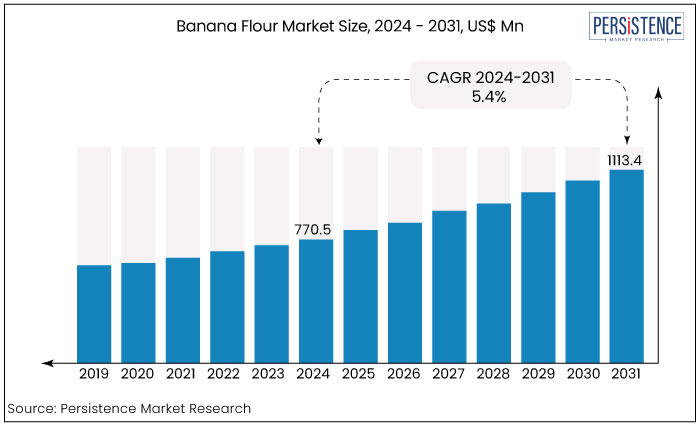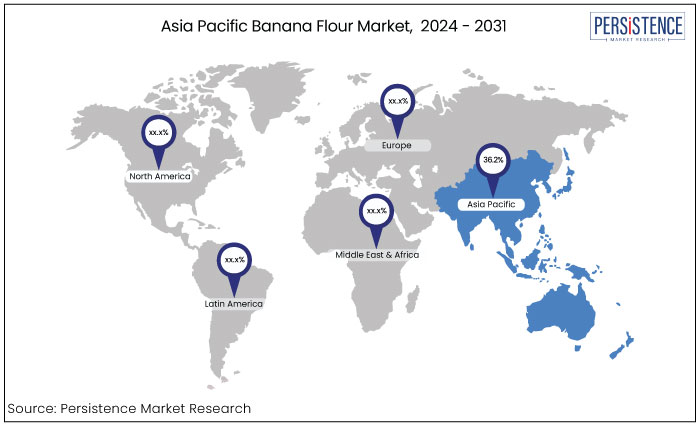Industry: Food and Beverages
Published Date: October-2024
Format: PPT*, PDF, EXCEL
Delivery Timelines: Contact Sales
Number of Pages: 160
Report ID: PMRREP20983
The banana flour market is estimated to increase from US$770.5 Mn in 2024 to US$1113.4 Mn by 2031. The market is projected to record a CAGR of 5.4% during the forecast period from 2024 to 2031. The industry has seen significant growth due to the rising demand for gluten-free alternatives and the growing popularity of plant-based diets. The market is also witnessing a rise in product diversification and sustainability.

Key Highlights of the Market
|
Market Attributes |
Key Insights |
|
Banana Flour Market Size (2024E) |
US$770.5 Mn |
|
Projected Market Value (2031F) |
US$1113.4 Mn |
|
Global Market Growth Rate (CAGR 2024 to 2031) |
5.4% |
|
Historical Market Growth Rate (CAGR 2019 to 2023) |
5.0% |
|
Region |
Market Share in 2024 |
|
Asia Pacific |
36.2% |
Asia Pacific is expected to emerge as a dominant force in the banana flour market in 2024 capturing approximately 36.2% of the global revenue share. Countries like India, China, the Philippines, and Indonesia are among the world's top banana producers, contributing significantly to this market. This region boasts the largest population and a vast consumer base for food and beverages.
Traditionally, bananas have been a staple fruit, but over the past decade, there has been a growing recognition of the health benefits associated with banana flour. As a result, manufacturers are increasingly focusing on developing banana-based products, positioning them as healthy alternatives to processed foods. Moreover, the rising awareness of gluten intolerance is prompting consumers in Asia and worldwide to seek gluten-free options further driving demand for banana flour.

|
Category |
Market Share in 2024 |
|
End Use - Food |
72.4% |
The food industry is predicted to lead the segment in the banana flour market, capturing an impressive 72.4% of global revenue. This versatile ingredient has gained popularity as a gluten-free substitute for wheat flour, making it a staple in health-conscious baking. Bakeries are now utilizing banana flour to create natural gluten-free and nut-free products catering to diverse dietary needs.
Green banana flour is particularly noteworthy for its ability to enhance the nutritional profile of pasta-based dishes. Given that bread is the most widely consumed bakery item worldwide, incorporating banana flour can significantly boost its nutritional value. Additionally, banana flour can be easily integrated into daily diets by mixing it into smoothies, yogurt, or other foods, allowing consumers to reap its health benefits effortlessly.
|
Category |
CAGR through 2031 |
|
Nature - Organic |
7.98% |
The organic segment is projected to experience a CAGR of 7.98% through 2031. As consumers increasingly embrace clean eating, the demand for organic products has surged significantly. This trend has led to a growing interest in banana flour made from organic ingredients, particularly among those seeking chemical- and pesticide-free options.
Banana flour manufacturers are forging strong partnerships with farmers and suppliers to ensure the quality of the bananas used in production to meet rising demand. A prime example is Miski Organics, which offers certified organic green banana flour. This product is renowned for its high antioxidant content, contributing positively to human health and overall well-being, thereby driving the market further.
The banana flour market overview shows that the industry has great potential for growth in upcoming years. Banana flour, derived from green bananas, is a gluten-free alternative to traditional wheat flour, making it an attractive option for health-conscious consumers and those with dietary restrictions. Its versatility allows it to be used in various culinary applications such as baking and cooking, and as a thickening agent in sauces or soups.
Banana flour is increasingly incorporated into gluten-free products, health bars, and baby food enhancing its appeal in the ever-growing health and wellness sector. The industry has experienced significant growth in recent years driven by a surge in consumer interest in gluten-free diets and clean-label products.
One of the primary banana flour market trends shaping this industry is the rising demand for gluten-free alternatives as more individuals are diagnosed with celiac disease or opt for gluten-free lifestyles for health reasons.
The increasing awareness of the health benefits associated with banana flour such as its highly resistant starch content that aids in digestion and supports gut health, continues to attract a diverse consumer base. Another notable trend is the growing popularity of plant-based diets, which has fueled interest in innovative ingredients like banana flour that offer nutritional benefits without compromising taste.
The market is also witnessing a rise in product diversification with manufacturers experimenting with blends of banana flour and other gluten-free flour to enhance the flavor and texture of baked goods. Additionally, sustainability is becoming a pivotal factor as consumers favor products that promote eco-friendly practices leading to a push for sourcing bananas from sustainable farms.
The banana flour market analysis has shown remarkable growth over the past decade largely fueled by the increasing consumer shift toward gluten-free and health-conscious food options. Initially, banana flour was primarily used in niche markets particularly among those with dietary restrictions. However, as awareness of its nutritional benefits such as high fiber content and low glycemic index has spread, its adoption has expanded significantly.
The rise of gluten-free diets, driven by both health concerns and lifestyle choices has played a pivotal role in this growth. In recent years, the market has seen a surge in product innovation, with manufacturers introducing banana flour into various food products, including baked goods, snacks, and baby foods. This diversification has broadened its consumer base and enhanced its visibility in mainstream grocery stores.
The trend toward clean-label products has further propelled the market as consumers increasingly seek out natural and minimally processed ingredients. The industry is poised for continued expansion. The growing popularity of plant-based diets and the increasing emphasis on sustainable food sources are expected to open several banana flour market opportunities.
As more consumers become aware of the health benefits of banana flour, its applications in home cooking and commercial food production are likely to increase. The market is also anticipated to benefit from strategic partnerships and collaborations among food manufacturers, which will enhance distribution channels and product availability.
Rising Demand for Gluten-Free Products
The increasing prevalence of gluten intolerance and celiac disease has significantly boosted the demand for gluten-free alternatives, including banana flour. As consumers become more health-conscious and seek to eliminate gluten from their diets, banana flour has emerged as a popular substitute due to its natural properties and nutritional benefits.
Its versatility in baking and cooking allows it to be seamlessly integrated into various recipes, appealing to both gluten-sensitive individuals and those looking to adopt healthy eating habits. This trend is expected to continue driving banana flour market growth.
Health and Nutritional Benefits
Banana flour is rich in dietary fiber, vitamins, and minerals making it an attractive option for health-conscious consumers. Its high resistant starch content aids digestion and promotes gut health, which aligns with the growing trend of functional foods that offer health benefits beyond basic nutrition.
As awareness of these advantages spreads, more consumers are incorporating banana flour into their diets, whether in baked goods, smoothies, or as a thickening agent. This focus on health and wellness is a significant growth driver for banana flour market.
Increasing Popularity of Plant-Based Diets
The global shift toward plant-based diets is another key driver for the banana flour market expansion. As more individuals adopt vegetarian and vegan lifestyles, the demand for plant-based ingredients has surged.
Banana flour, being a natural and versatile ingredient, fits perfectly into this trend, offering a nutritious alternative to traditional flours. Its ability to enhance the texture and flavor of various dishes makes it a favored choice among consumers looking to create plant-based meals. This growing interest in plant-based eating is expected to further propel the market forward.
Limited Consumer Awareness
One of the significant factors hindering the banana flour market growth is the limited consumer awareness regarding its benefits and uses. Many potential customers are unfamiliar with banana flour as a viable alternative to traditional flours, which can restrict its adoption in everyday cooking and baking.
Lack of knowledge can lead to hesitance in trying new products ultimately affecting sales. To overcome this barrier, effective marketing and educational campaigns are essential to inform consumers about the nutritional advantages and versatility of banana flour in various recipes.
Supply Chain Challenges
The banana flour market faces challenges related to limited production and supply, which can impede growth. Factors such as adverse weather conditions, disease outbreaks affecting banana crops, and logistical issues can disrupt the supply chain leading to shortages and increased prices.
These supply constraints can deter manufacturers from investing in banana flour production and limit the availability of the product in retail outlets. As a result, addressing these supply chain vulnerabilities is crucial for ensuring consistent market growth and meeting rising consumer demand for banana flour.
Use into Functional Foods
The growing trend toward functional foods presents a significant opportunity for the banana flour market expansion. As consumers increasingly seek foods that offer added health benefits, banana flour can be marketed as a nutritious ingredient that supports digestive health, weight management, and overall wellness due to its high fiber and resistant starch content.
By collaborating with food manufacturers to develop innovative functional food products such as health bars, snacks, and meal replacements, banana flour can capture a large share of the health-conscious consumer segment driving market growth.
Development of Sustainable Sourcing Practices
As sustainability becomes a priority for consumers, the banana flour market has the opportunity to emphasize eco-friendly sourcing and production practices. By partnering with banana farmers to implement sustainable agricultural methods, the industry can improve the environmental impact of banana flour production.
Certifications for organic and sustainably sourced products can enhance consumer trust and brand loyalty helping to differentiate banana flour in a competitive market while fostering a commitment to responsible consumption and production.
The banana flour market is experiencing remarkable growth highlighted by recent industry reports that emphasize its dynamic nature. To benefit from this thriving sector, industry players are actively introducing innovative products and utilizing cutting-edge technologies to create new opportunities.
Key companies are implementing essential business strategies including diversifying their product lines, expanding their market reach across various regions, and investing in research and development.
By adopting these proactive measures, market participants strive to maintain a competitive edge, adapt to changing consumer preferences, and further propel growth within the industry. The ongoing evolution of the banana flour market reveals a promising future driven by a commitment to innovation and responsiveness to consumer needs.
Recent Developments in the Banana Flour Market
|
Attributes |
Details |
|
Forecast Period |
2024 to 2031 |
|
Historical Data Available for |
2019 to 2023 |
|
Market Analysis |
US$ Million for Value |
|
Key Regions Covered |
|
|
Key Market Segments Covered |
|
|
Key Companies Profiled |
|
|
Report Coverage |
|
|
Customization & Pricing |
Available upon request |
By Nature
By End-use
By Region
To know more about delivery timeline for this report Contact Sales

The market is predicted to rise from US$770.5 Mn in 2024 to US$1113.4 Mn by 2031.
Leading industry players in the market are Natural Evolution, International Agriculture Group, and Absolute Organic.
The food industry is the leading segment and is predicted to capture 72.4% of global revenue.
Asia Pacific is leading regional market and is expected to account for 36.2% of the market share.
A key opportunity lies in this industry include the increasing consumer shift toward gluten-free and health-conscious food options.